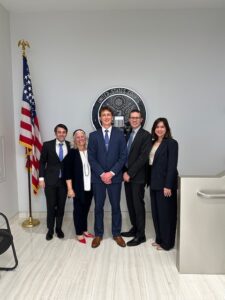
Three federal judges heard arguments on Monday in Honolulu, Hawaii, as the Ninth Circuit considered Borja v. Nago, a federal lawsuit that seeks to expand voting rights in U.S. territories by challenging discriminatory federal and state overseas voting laws.
Under the challenged laws, former residents of Hawaii or other states who live in a foreign country or the Northern Mariana Islands remain free to vote for president by absentee ballot in their former state of residence. But former residents who live in Guam, the U.S. Virgin Islands, or other territories cannot. The Borja plaintiffs argue this violates the Constitution’s guarantee of equal protection. Today’s hearing was an appeal of a 2022 district court decision denying their claims, according to the press release.
Lead Plaintiff Benny Borja, a Navy veteran, was in Honolulu recovering from open heart surgery to address a service-connected ailment. While he was unable to join the argument in person because of his recovery, he stated: “I hope the court will recognize that my right to vote is as fundamental as any other U.S. citizen. I served my country. I deserve to be treated the same as everyone else.”
“The Ninth Circuit has the opportunity to ensure the same legal standards apply to voting in U.S. territories as they do to voting anywhere else,” said Neil Weare, co-counsel in the case and co-director of Right to Democracy, which has joined Borja to sue to advance democracy, equity, self-determination in U.S. territories. “Discrimination of the right to vote should not be permitted just because it happens to affect people in U.S. territories.”
“It is astonishing that under federal and state overseas voting laws that someone who decides to live in the British Virgin Islands can keep voting for president in their last state of residence, but our clients cannot because they decided to live in the U.S. Virgin Islands,” said Pamela Colon, a U.S. Virgin Islands attorney who was in Hawaii for the argument. “The Ninth Circuit should rule that kind of discrimination in voting violates the Constitution’s guarantee of equal protection.”
The Borja plaintiffs are also represented by former Guam resident T.J. Quan, who is an attorney in Hawaii, and Vanessa Williams, a Guam attorney. The appeal was argued by Parker Rider-Longmaid, Counsel at Skadden, Arps, Slate, Meagher & Flom LLP, the press release stated.
The Ninth Circuit panel included Judge Milan D. Smith Jr., Judge Richard A. Paez, and Judge Lucy H. Koh. The Ninth Circuit will issue its decision in the coming months, the release stated.
The lawsuit is part of a broader effort by Right to Democracy to advance democracy, equity, and self-determination in U.S. territories. Right to Democracy does not take a position on political status – it believes that it is for the people of each territory to decide. But when federal or state laws discriminate to unconstitutionally deny residents of U.S. territories their rights, including the right to vote, it believes courts can and should intervene, it said.
More information about Borja v. Nago can be found here. Audio and video of the argument are available here.


